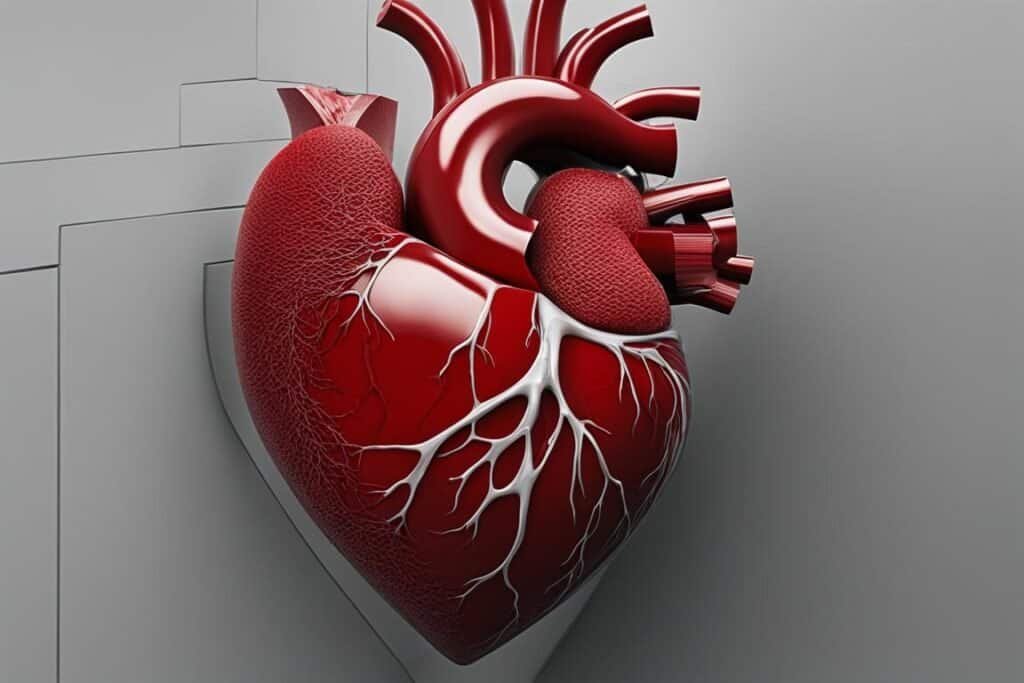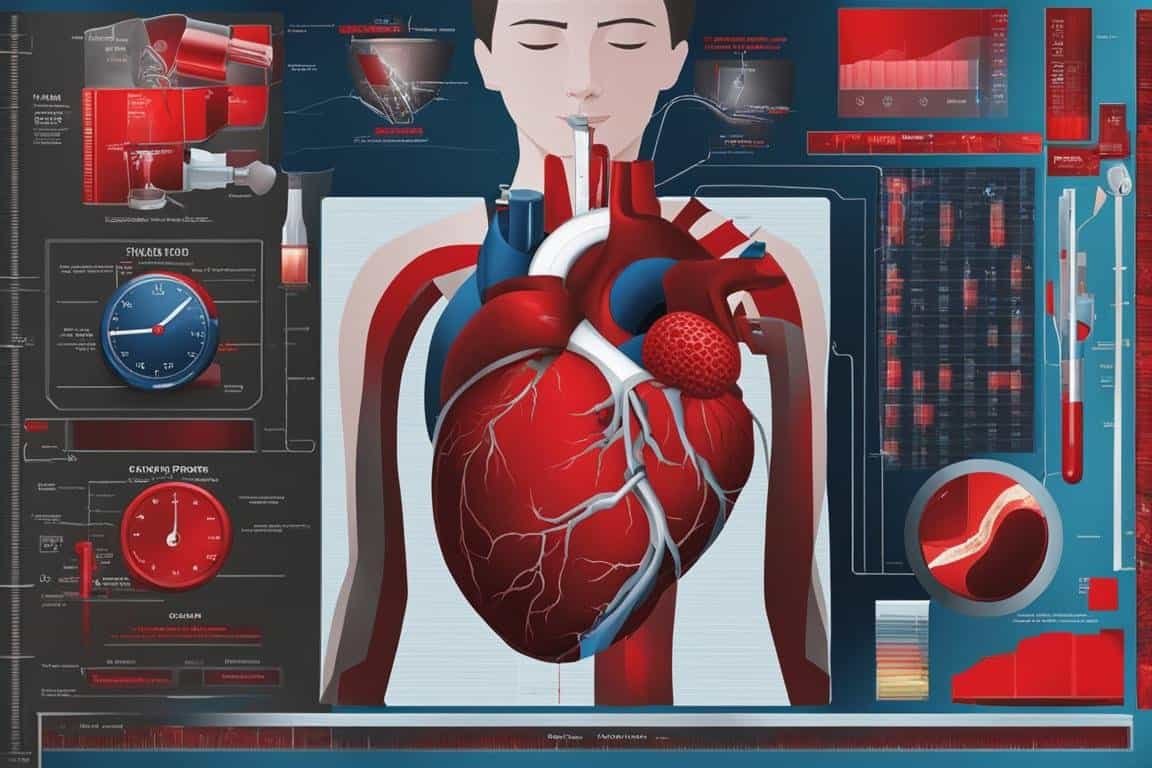High blood pressure, also known as hypertension, can have serious consequences for your health. It can lead to various health complications and increase the risk of life-threatening conditions such as heart attack and stroke. Elevated blood pressure can cause damage to arteries, the heart, brain, kidneys, and eyes. It can also impact sexual function and even lead to high blood pressure emergencies. It is important to understand the risks associated with high blood pressure and take steps to manage and control it.
Key Takeaways:
- High blood pressure can have harmful effects on the body, impacting various organs and systems.
- Arterial damage caused by hypertension can lead to reduced blood flow and the development of an aneurysm.
- High blood pressure can damage the heart, leading to coronary artery disease, heart failure, and an enlarged left ventricle.
- The brain is also at risk, with high blood pressure increasing the chances of TIA, stroke, and cognitive impairment.
- Kidney damage and failure can occur as a result of untreated high blood pressure.
Damage to Arteries
High blood pressure can have detrimental effects on your arteries. The constant high pressure can cause damage to the inner lining of the arteries, leading to arterial damage and narrowing. This narrowing restricts the flow of blood throughout your body, impacting various organs and tissues.
With damaged and narrowed arteries, the flow of blood becomes limited, resulting in adverse health consequences. The damaged arteries may accumulate fats, known as plaque, which further narrows the blood vessels and restricts blood flow. This process, known as atherosclerosis, can impede the delivery of vital oxygen and nutrients to the organs and tissues.
In some cases, high blood pressure can even lead to the formation of an aneurysm. An aneurysm occurs when a weakened artery wall bulges and may rupture, causing life-threatening bleeding. It is crucial to understand the severity of arterial damage caused by high blood pressure and take proactive measures to manage and control your blood pressure levels.
By maintaining a healthy lifestyle, which includes a balanced diet, regular exercise, proper stress management, and prescribed medications, you can reduce the risk of arterial damage and its associated complications. Monitoring your blood pressure regularly and adhering to your healthcare professional’s recommendations is essential to safeguarding your arterial health and overall well-being.

| Effects of Arterial Damage | Symptoms |
|---|---|
| Damaged and narrowed arteries | Chest pain (angina), shortness of breath, fatigue |
| Accumulation of plaque | Reduced blood flow to organs, increased risk of heart attack and stroke |
| Aneurysm | Pain in the affected area, bleeding, symptoms vary depending on the location of the aneurysm |
Damage to the Heart
High blood pressure can have serious effects on the heart. It can lead to the development of coronary artery disease, a condition where the arteries supplying blood to the heart become narrowed and damaged. This can result in chest pain, irregular heart rhythms, and even a heart attack. High blood pressure can also cause the heart muscle to weaken or become stiff, leading to heart failure. It can also result in the enlargement of the left ventricle, increasing the risk of heart attack and sudden cardiac death. Additionally, high blood pressure raises the risk of developing metabolic syndrome, which can lead to heart disease, stroke, and diabetes.

Effects of High Blood Pressure on the Heart:
- Coronary artery disease: Narrowed and damaged arteries can reduce blood flow to the heart, leading to chest pain, irregular heart rhythms, and heart attack.
- Heart failure: High blood pressure can weaken or stiffen the heart muscle, impairing its ability to pump blood effectively.
- Enlarged left heart: Increased pressure in the arteries can cause the left ventricle to enlarge, increasing the risk of heart attack and sudden cardiac death.
- Metabolic syndrome: High blood pressure raises the risk of developing metabolic syndrome, a cluster of conditions that increase the risk of heart disease, stroke, and diabetes.
Damage to the Brain
High blood pressure can have detrimental effects on the brain. It increases the risk of experiencing a transient ischemic attack (TIA), also known as a ministroke, as well as a full-blown stroke. These conditions occur when blood flow to the brain is blocked or disrupted, leading to brain cell damage.
High blood pressure can also contribute to the development of dementia, particularly vascular dementia, which is caused by narrowed or blocked arteries limiting blood flow to the brain. Furthermore, it may contribute to mild cognitive impairment, a condition characterized by memory and cognitive difficulties.
Damage to the Kidneys
The kidneys play a crucial role in filtering waste and excess fluid from your blood. However, high blood pressure can have damaging effects on the kidneys, leading to kidney damage and potentially kidney failure. When blood pressure is consistently elevated, it can harm the blood vessels in and leading to the kidneys, impairing their ability to effectively filter waste.
This damage to the kidneys can result in a condition called kidney failure, where the kidneys cannot function properly and are unable to adequately filter waste products from the blood. Kidney failure is a serious and potentially life-threatening condition that may require interventions such as dialysis or a kidney transplant to sustain kidney function.
It is essential to manage and control high blood pressure to prevent kidney damage and the progression to kidney failure. Regular monitoring of blood pressure levels, following a healthy diet, engaging in regular physical activity, and taking prescribed medications as directed by your healthcare provider can help protect your kidneys from the harmful effects of high blood pressure.
| Signs and Symptoms of Kidney Damage | Preventive Measures |
|---|---|
|
|
Damage to the Eyes, Sexual Conditions, and High Blood Pressure Emergencies
High blood pressure not only affects your cardiovascular system but can also have detrimental effects on other parts of your body. One area that can be affected by high blood pressure is your eyes. Elevated blood pressure can lead to damage to the blood vessels in the retina, causing a condition called hypertensive retinopathy. Over time, this can result in decreased blood flow to the retina, fluid buildup under the retina, and optic nerve damage. If left untreated, it can lead to vision loss and even blindness.
In addition to eye damage, high blood pressure can also impact your sexual function. Men with high blood pressure may experience erectile dysfunction due to decreased blood flow to the penis. Similarly, women may experience reduced blood flow to the vagina, making sexual arousal and satisfaction more challenging. It is important to note that treating high blood pressure can help improve sexual function in both men and women.
Furthermore, high blood pressure emergencies can occur, requiring immediate medical attention. These emergencies may include hypertensive crisis, characterized by a sudden and severe increase in blood pressure, or other conditions such as hypertensive encephalopathy, a potentially life-threatening neurological condition. If you experience symptoms such as severe headache, chest pain, shortness of breath, changes in vision, or confusion, it is crucial to seek immediate medical care to prevent serious complications like heart attack, stroke, or kidney failure.

